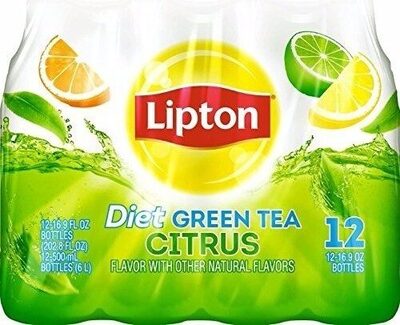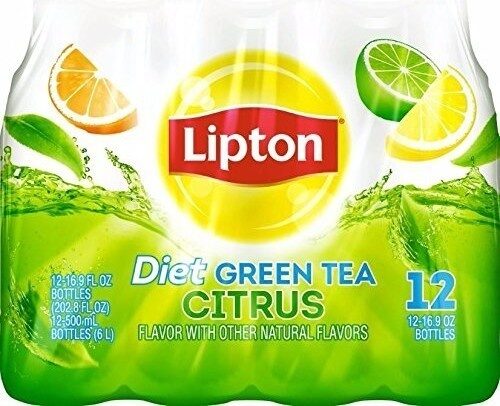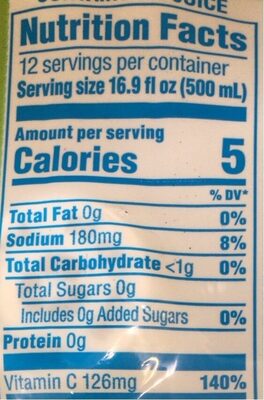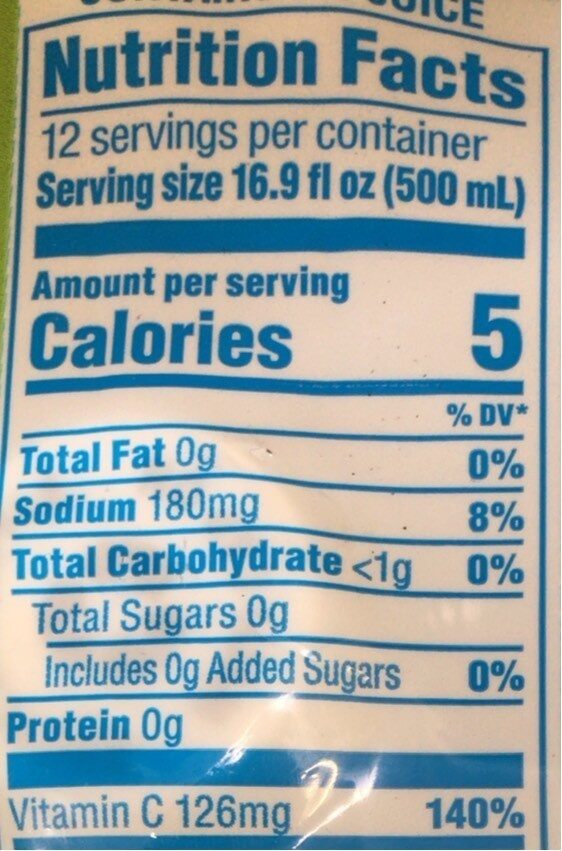Help us make food transparency the norm!
As a non-profit organization, we depend on your donations to continue informing consumers around the world about what they eat.
The food revolution starts with you!
Lipton diet green tea with citrus pack
Lipton diet green tea with citrus pack
This product page is not complete. You can help to complete it by editing it and adding more data from the photos we have, or by taking more photos using the app for Android or iPhone/iPad. Thank you!
×
Barcode: 0012000012792 (EAN / EAN-13) 012000012792 (UPC / UPC-A)
Categories: Plant-based foods and beverages, Beverages, Hot beverages, Plant-based beverages, Teas, Green teas
Countries where sold: United States
Matching with your preferences
Health
Ingredients
-
16 ingredients
Water, citric acid, sodium hexametaphosphate (to protect flavor), green tea, natural flavor, ascorbic acid (vitamin c), phosphoric acid, potassium sorbate (preserves freshness), aspartame, acesulfame potassium, citrus pectin, calcium disodium edta (to pro
Food processing
-
Ultra processed foods
Elements that indicate the product is in the 4 - Ultra processed food and drink products group:
- Additive: E440 - Pectins
- Additive: E452 - Polyphosphates
- Additive: E950 - Acesulfame k
- Additive: E951 - Aspartame
- Ingredient: Flavouring
Food products are classified into 4 groups according to their degree of processing:
- Unprocessed or minimally processed foods
- Processed culinary ingredients
- Processed foods
- Ultra processed foods
The determination of the group is based on the category of the product and on the ingredients it contains.
Additives
-
E202 - Potassium sorbate
Potassium sorbate (E202) is a synthetic food preservative commonly used to extend the shelf life of various food products.
It works by inhibiting the growth of molds, yeast, and some bacteria, preventing spoilage. When added to foods, it helps maintain their freshness and quality.
Some studies have shown that when combined with nitrites, potassium sorbate have genotoxic activity in vitro. However, potassium sorbate is generally recognized as safe (GRAS) by regulatory authorities.
-
E330 - Citric acid
Citric acid is a natural organic acid found in citrus fruits such as lemons, oranges, and limes.
It is widely used in the food industry as a flavor enhancer, acidulant, and preservative due to its tart and refreshing taste.
Citric acid is safe for consumption when used in moderation and is considered a generally recognized as safe (GRAS) food additive by regulatory agencies worldwide.
-
E338 - Phosphoric acid
Phosphoric acid: Phosphoric acid -also known as orthophosphoric acid or phosphoricV acid- is a weak acid with the chemical formula H3PO4. Orthophosphoric acid refers to phosphoric acid, which is the IUPAC name for this compound. The prefix ortho- is used to distinguish the acid from related phosphoric acids, called polyphosphoric acids. Orthophosphoric acid is a non-toxic acid, which, when pure, is a solid at room temperature and pressure. The conjugate base of phosphoric acid is the dihydrogen phosphate ion, H2PO−4, which in turn has a conjugate base of hydrogen phosphate, HPO2−4, which has a conjugate base of phosphate, PO3−4. Phosphates are essential for life.The most common source of phosphoric acid is an 85% aqueous solution; such solutions are colourless, odourless, and non-volatile. The 85% solution is a syrupy liquid, but still pourable. Although phosphoric acid does not meet the strict definition of a strong acid, the 85% solution is acidic enough to be corrosive. Because of the high percentage of phosphoric acid in this reagent, at least some of the orthophosphoric acid is condensed into polyphosphoric acids; for the sake of labeling and simplicity, the 85% represents H3PO4 as if it were all in the ortho form. Dilute aqueous solutions of phosphoric acid exist in the ortho form.Source: Wikipedia
-
E440 - Pectins
Pectins (E440) are natural carbohydrates, predominantly found in fruits, that act as gelling agents in the food industry, creating the desirable jelly-like texture in jams, jellies, and marmalades.
Pectins stabilize and thicken various food products, such as desserts, confectioneries, and beverages, ensuring a uniform consistency and quality.
Recognized as safe by various health authorities, pectins have been widely used without notable adverse effects when consumed in typical dietary amounts.
-
E950 - Acesulfame k
Acesulfame potassium: Acesulfame potassium - AY-see-SUL-faym-, also known as acesulfame K -K is the symbol for potassium- or Ace K, is a calorie-free sugar substitute -artificial sweetener- often marketed under the trade names Sunett and Sweet One. In the European Union, it is known under the E number -additive code- E950. It was discovered accidentally in 1967 by German chemist Karl Clauss at Hoechst AG -now Nutrinova-. In chemical structure, acesulfame potassium is the potassium salt of 6-methyl-1‚2,3-oxathiazine-4-3H--one 2‚2-dioxide. It is a white crystalline powder with molecular formula C4H4KNO4S and a molecular weight of 201.24 g/mol.Source: Wikipedia
-
E951 - Aspartame
Aspartame: Aspartame -APM- is an artificial non-saccharide sweetener used as a sugar substitute in some foods and beverages. In the European Union, it is codified as E951. Aspartame is a methyl ester of the aspartic acid/phenylalanine dipeptide. A panel of experts set up by the European Food Safety Authority concluded in 2013 that aspartame is safe for human consumption at current levels of exposure. As of 2018, evidence does not support a long-term benefit for weight loss or in diabetes. Because its breakdown products include phenylalanine, people with the genetic condition phenylketonuria -PKU- must be aware of this as an additional source.It was first sold under the brand name NutraSweet. It was first made in 1965, and the patent expired in 1992. It was initially approved for use in food products by the U.S. Food and Drug Administration -FDA- in 1981. The safety of aspartame has been the subject of several political and medical controversies, United States congressional hearings, and Internet hoaxes.Source: Wikipedia
Ingredients analysis
-
Palm oil free
No ingredients containing palm oil detected
Unrecognized ingredients: Preserves-freshness, To-proSome ingredients could not be recognized.
We need your help!
You can help us recognize more ingredients and better analyze the list of ingredients for this product and others:
- Edit this product page to correct spelling mistakes in the ingredients list, and/or to remove ingredients in other languages and sentences that are not related to the ingredients.
- Add new entries, synonyms or translations to our multilingual lists of ingredients, ingredient processing methods, and labels.
If you would like to help, join the #ingredients channel on our Slack discussion space and/or learn about ingredients analysis on our wiki. Thank you!
-
Vegan status unknown
Unrecognized ingredients: Vitamin C, Preserves-freshness, To-proSome ingredients could not be recognized.
We need your help!
You can help us recognize more ingredients and better analyze the list of ingredients for this product and others:
- Edit this product page to correct spelling mistakes in the ingredients list, and/or to remove ingredients in other languages and sentences that are not related to the ingredients.
- Add new entries, synonyms or translations to our multilingual lists of ingredients, ingredient processing methods, and labels.
If you would like to help, join the #ingredients channel on our Slack discussion space and/or learn about ingredients analysis on our wiki. Thank you!
-
Vegetarian status unknown
Unrecognized ingredients: Vitamin C, Preserves-freshness, To-proSome ingredients could not be recognized.
We need your help!
You can help us recognize more ingredients and better analyze the list of ingredients for this product and others:
- Edit this product page to correct spelling mistakes in the ingredients list, and/or to remove ingredients in other languages and sentences that are not related to the ingredients.
- Add new entries, synonyms or translations to our multilingual lists of ingredients, ingredient processing methods, and labels.
If you would like to help, join the #ingredients channel on our Slack discussion space and/or learn about ingredients analysis on our wiki. Thank you!
-
Details of the analysis of the ingredients
We need your help!
Some ingredients could not be recognized.
We need your help!
You can help us recognize more ingredients and better analyze the list of ingredients for this product and others:
- Edit this product page to correct spelling mistakes in the ingredients list, and/or to remove ingredients in other languages and sentences that are not related to the ingredients.
- Add new entries, synonyms or translations to our multilingual lists of ingredients, ingredient processing methods, and labels.
If you would like to help, join the #ingredients channel on our Slack discussion space and/or learn about ingredients analysis on our wiki. Thank you!
: Water, citric acid, sodium hexametaphosphate (to protect flavor), green tea, natural flavor, ascorbic acid (vitamin c), phosphoric acid, potassium sorbate (preserves freshness), aspartame, acesulfame potassium, citrus pectin, calcium disodium edta, to pro- Water -> en:water - vegan: yes - vegetarian: yes - ciqual_food_code: 18066 - percent_min: 7.69230769230769 - percent_max: 100
- citric acid -> en:e330 - vegan: yes - vegetarian: yes - percent_min: 0 - percent_max: 50
- sodium hexametaphosphate -> en:e452i - vegan: yes - vegetarian: yes - percent_min: 0 - percent_max: 33.3333333333333
- to protect flavor -> en:preservative - percent_min: 0 - percent_max: 33.3333333333333
- green tea -> en:green-tea - vegan: yes - vegetarian: yes - ciqual_food_code: 18155 - percent_min: 0 - percent_max: 25
- natural flavor -> en:natural-flavouring - vegan: maybe - vegetarian: maybe - percent_min: 0 - percent_max: 5
- ascorbic acid -> en:e300 - vegan: yes - vegetarian: yes - percent_min: 0 - percent_max: 5
- vitamin c -> en:vitamin-c - percent_min: 0 - percent_max: 5
- phosphoric acid -> en:e338 - vegan: yes - vegetarian: yes - percent_min: 0 - percent_max: 5
- potassium sorbate -> en:e202 - vegan: yes - vegetarian: yes - percent_min: 0 - percent_max: 5
- preserves freshness -> en:preserves-freshness - percent_min: 0 - percent_max: 5
- aspartame -> en:e951 - vegan: yes - vegetarian: yes - percent_min: 0 - percent_max: 5
- acesulfame potassium -> en:e950 - vegan: yes - vegetarian: yes - percent_min: 0 - percent_max: 5
- citrus pectin -> en:citrus-pectin - vegan: yes - vegetarian: yes - percent_min: 0 - percent_max: 5
- calcium disodium edta -> en:e385 - vegan: yes - vegetarian: yes - percent_min: 0 - percent_max: 5
- to pro -> en:to-pro - percent_min: 0 - percent_max: 5
Nutrition
-
Average nutritional quality
⚠ ️Note: the Nutri-Score of teas and herbal teas corresponds to the product prepared with water only, without sugar or milk.⚠ ️Warning: the amount of fruits, vegetables and nuts is not specified on the label, it was estimated from the list of ingredients: 0This product is considered a beverage for the calculation of the Nutri-Score.
Positive points: 0
- Proteins: 0 / 5 (value: 0, rounded value: 0)
- Fiber: 0 / 5 (value: 0, rounded value: 0)
- Fruits, vegetables, nuts, and colza/walnut/olive oils: 0 / 10 (value: 0.0510817307692264, rounded value: 0.1)
Negative points: 2
- Energy: 1 / 10 (value: 14, rounded value: 14)
- Sugars: 1 / 10 (value: 0.2, rounded value: 0.2)
- Saturated fat: 0 / 10 (value: 0, rounded value: 0)
- Sodium: 0 / 10 (value: 36, rounded value: 36)
The points for proteins are counted because the negative points are less than 11.
Nutritional score: (2 - 0)
Nutri-Score:
-
Nutrition facts
Nutrition facts As sold
for 100 g / 100 mlAs sold
per serving (500 ml (1 BOTTLE))Compared to: Green teas Energy 14 kj
(3 kcal)70 kj
(16 kcal)-83% Fat 0 g 0 g -100% Saturated fat 0 g 0 g -100% Carbohydrates 0 g 0 g -100% Sugars 0.2 g 1 g -87% Fiber 0 g 0 g -100% Proteins 0 g 0 g -100% Salt 0.09 g 0.45 g +765% Vitamin C (ascorbic acid) 25.2 mg 126 mg -51% Fruits‚ vegetables‚ nuts and rapeseed‚ walnut and olive oils (estimate from ingredients list analysis) 0.051 % 0.051 %
Environment
-
Eco-Score B - Low environmental impact
⚠ ️Select a country in order to include the full impact of transportation.The Eco-Score is an experimental score that summarizes the environmental impacts of food products.→ The Eco-Score was initially developped for France and it is being extended to other European countries. The Eco-Score formula is subject to change as it is regularly improved to make it more precise and better suited to each country.Life cycle analysis
-
Average impact of products of the same category: A (Score: 100/100)
Category: Tea, brewed, without sugar
Category: Tea, brewed, without sugar
- PEF environmental score: 0.01 (the lower the score, the lower the impact)
- including impact on climate change: 0.04 kg CO2 eq/kg of product
Stage Impact Agriculture
62.5 %Processing
0.0 %Packaging
1.7 %Transportation
1.8 %Distribution
0.3 %Consumption
33.7 %
Bonuses and maluses
-
Missing origins of ingredients information
Malus: -5
⚠ ️ The origins of the ingredients of this product are not indicated.
If they are indicated on the packaging, you can modify the product sheet and add them.
If you are the manufacturer of this product, you can send us the information with our free platform for producers.
-
Missing packaging information for this product
Malus: -15
⚠ ️ The information about the packaging of this product is not filled in.⚠ ️ For a more precise calculation of the Eco-Score, you can modify the product page and add them.
If you are the manufacturer of this product, you can send us the information with our free platform for producers.
Eco-Score for this product
-
Impact for this product: B (Score: 79/100)
Product: Lipton diet green tea with citrus pack
Life cycle analysis score: 100
Sum of bonuses and maluses: -20
Final score: 79/100 (The score of products with non-recyclable and non-biodegradable packaging materials is capped at 79 (grade B).)
-
Carbon footprint
-
Equal to driving 0.0 km in a petrol car
4 g CO² per 100g of product
The carbon emission figure comes from ADEME's Agribalyse database, for the category: Tea, brewed, without sugar (Source: ADEME Agribalyse Database)
Stage Impact Agriculture
58.5 %Processing
0.0 %Packaging
6.7 %Transportation
5.8 %Distribution
0.4 %Consumption
28.6 %
Packaging
-
Missing packaging information for this product
⚠ ️ The information about the packaging of this product is not filled in.Take a photo of the recycling information Take a photo of the recycling information
Transportation
-
Origins of ingredients
Missing origins of ingredients information
⚠ ️ The origins of the ingredients of this product are not indicated.
If they are indicated on the packaging, you can modify the product sheet and add them.
If you are the manufacturer of this product, you can send us the information with our free platform for producers.Add the origins of ingredients for this product Add the origins of ingredients for this product
Report a problem
-
Incomplete or incorrect information?
Category, labels, ingredients, allergens, nutritional information, photos etc.
If the information does not match the information on the packaging, please complete or correct it. Open Food Facts is a collaborative database, and every contribution is useful for all.
Data sources
Product added on by usda-ndb-import
Last edit of product page on by kiliweb.
Product page also edited by clockwerx, yuka.sY2b0xO6T85zoF3NwEKvlkIbbMWGng7tNj7gumOi-_C-FKT0ZtxD_9Dfaao.






